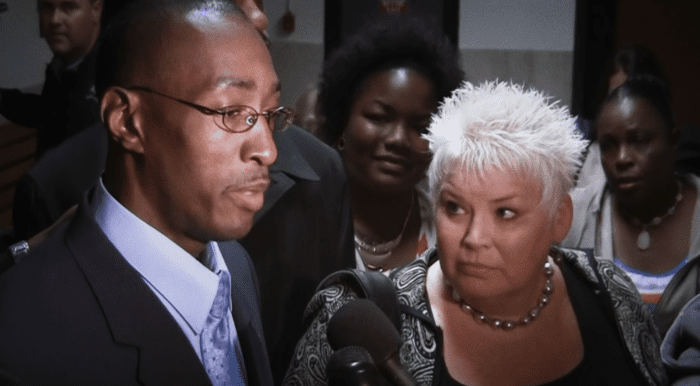
They built the broken system still in place today, and they have the nerve to praise it.
Among all of the insipid selfies and recycled memes shared in your small slice of the social sphere this past week, I hope that some of your friends recommended the new Netflix documentary series Trial Four. The story of Bostonian Sean Ellis, who was framed by the BPD for the 1993 killing of dirtbag detective John Mulligan, it’s also very much the tale of police in the Hub for the past 50 years or so.
In learning about how Ellis was made to spend more than two decades behind bars for a murder he didn’t commit, we see a smorgasbord of BPD atrocities in play, from bogus suspect lineups to cops who rob drug dealers despite already gorging on overtime dollars. We also see the other side, the desperation, of Black Boston in the ’80s and ’90s. As Ellis says in chapter two, “Usual Suspects,” “I tried to get a job. I remember going to the Dedham Mall trying to fill out applications. Never got a call back. How am I going to get money? My mother’s on drugs, and I need school clothes.”
Of the many outrages that fill each episode of Trial Four, to me the sickest are those volunteered by former Boston cops who still deny that they broke doors, rules, and noses in their innumerable racist roundups and arrests. These assholes built the broken system still in place today, and they have the nerve to praise it against all prevailing evidence. Gee, I wonder who they supported for president.
I’ve been called all sorts of things, some true, for my unrelenting mission to reveal the insidious savagery of our criminal justice system. Friends and family members think I’m totally insane, or at the very least still seeking revenge for wrongs done to me by law enforcement through the years. Again, they may be right to some degree, but not as right as prison abolitionists and criminal justice reformers have been since day one. I do what I do because I actually listen to those people, and read books and watch investigative docs like Trial Four.
This column is not the only polemic about cops that I wrote for the current issue of DigBoston. Just a few pages from this rant is a reflection on a much longer online feature that I worked on for more than a year about systemic racism in the Mass State Police. I understand that it may seem like overkill to some, but surely not to those who were sacked by a system set up to sabotage people of color.
Finally, while I’m often called skeptical, I have some hope. At least for Boston, as last week Mayor Marty Walsh took another step forward in forging an unprecedented independent BPD oversight apparatus. We’ll be watching closely to see how the implementation goes, but at this point it feels like we’ve made some progress since ’93. That may sound like a minor feat, but around here, it’s actually a big accomplishment.
Chris Faraone, Editor-in-Chief
A Queens, NY native who came to New England in 2004 to earn his MA in journalism at Boston University, Chris Faraone is the editor and co-publisher of DigBoston and a co-founder of the Boston Institute for Nonprofit Journalism. He has published several books including 99 Nights with the 99 Percent, and has written liner notes for hip-hop gods including Cypress Hill, Pete Rock, Nas, and various members of the Wu-Tang Clan.

